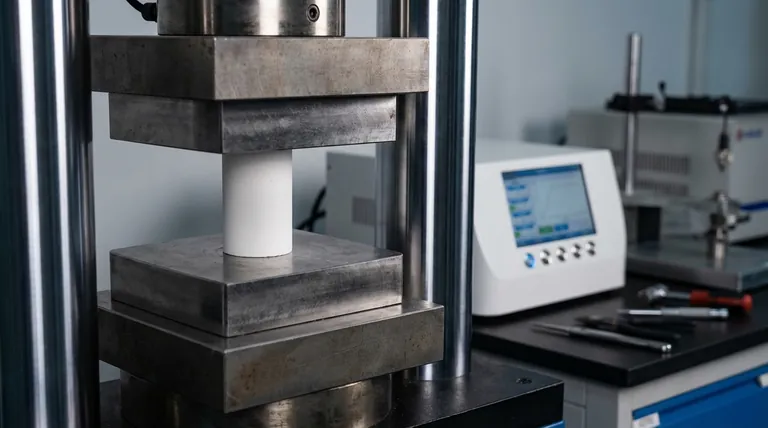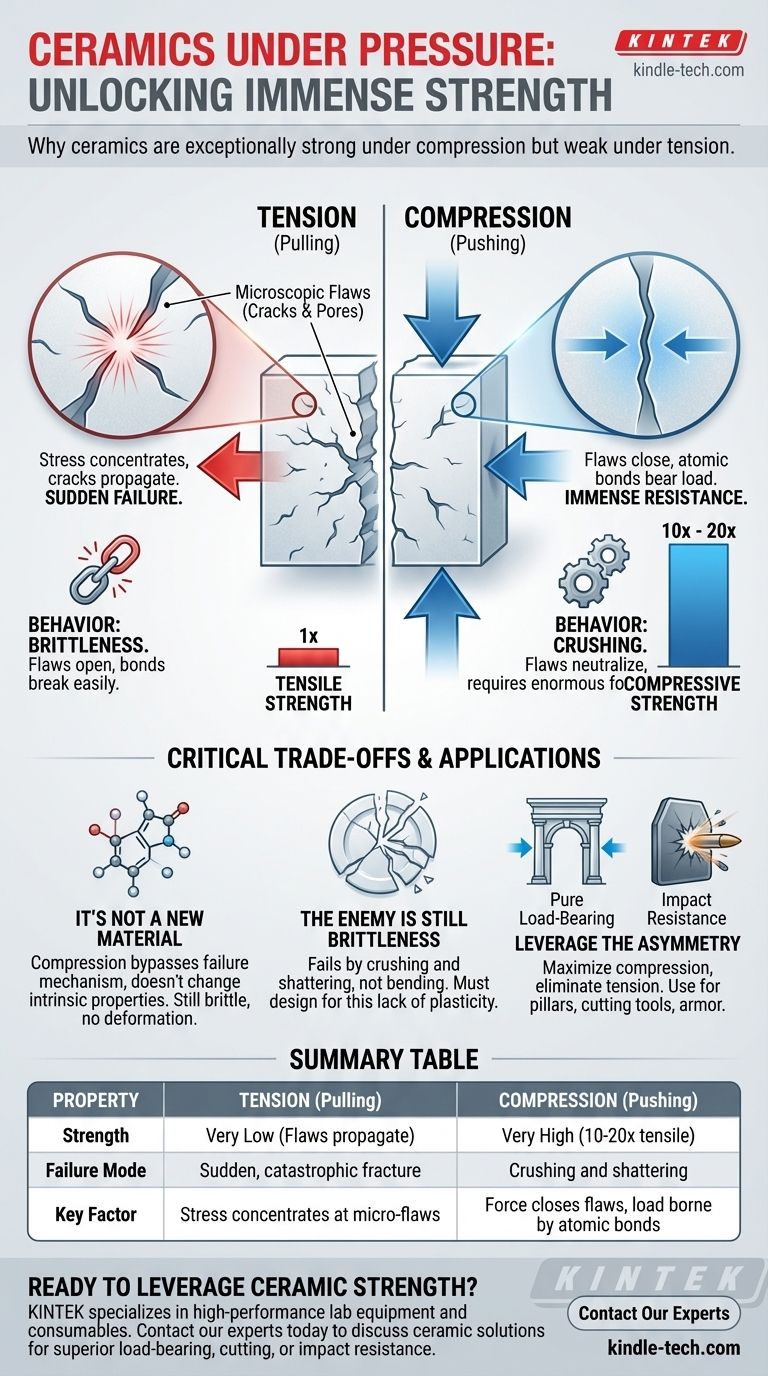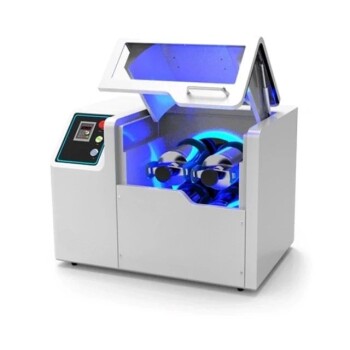はい、実用的な意味で、セラミックスは圧力下で非常に強いです。これは材料の内部特性が変化するためではなく、圧縮力がセラミックスを脆くする微細な欠陥を中和するためです。セラミックスを圧縮すると、引っ張り力の下で破砕を引き起こす可能性のある、微細な固有の亀裂が閉じられることになります。
セラミックスの圧縮下での途方もない強度は、材料自体が変化したものではありません。むしろ、圧縮荷重が材料の最大の弱点である既存の微細な欠陥を効果的に無効にし、その強力な原子結合が直接荷重を支えることを可能にするのです。
セラミックスにとって圧縮と引張が異なる世界である理由
この挙動を理解するには、材料を微視的なレベルで見る必要があります。その答えは、セラミックスの強力な原子構造と、避けられない微細な不完全さとの相互作用にあります。
セラミックスの構造
どんなに精巧に製造されたセラミックス材料であっても、微細な欠陥が含まれています。これらは、製造プロセスや冷却中に生じる微細な気孔、粒界、または微小な亀裂である可能性があります。
セラミックスの原子を結びつけるイオン結合や共有結合は非常に強力ですが、これらの欠陥が弱点として機能します。
引張下での挙動(引っ張る場合)
セラミックスを引っ張ると、すべての引張応力がこれらの微細な欠陥の鋭い先端に集中します。この強い集中は、小さな楔のように働き、原子結合を容易に引き剥がします。
単一の亀裂が発生し、伝播し始め、材料が非常に硬いため、亀裂はほぼ瞬時に物体全体を伝わります。これが、セラミックスが引張下で非常に小さな力で突然、壊滅的に破壊される理由であり、この挙動を脆性と呼びます。
圧縮下での挙動(押し潰す場合)
セラミックスを押し潰すと、まったく逆のことが起こります。圧縮力はこれらの微細な欠陥の側面を押し合わせ、効果的に閉じます。
これらの弱点が中和されると、材料の強度はもはやその欠陥によって左右されません。代わりに、荷重は全体の原子構造とその強力な化学結合によって支えられます。破壊は、この構造を粉砕するほどの途方もない力が加わった場合にのみ発生し、これには膨大なエネルギーが必要です。

重要なトレードオフと限界
圧縮強度が大きな利点である一方で、セラミックスを効果的に使用するためには、この特性の文脈と限界を理解することが不可欠です。
本質的に強くなるわけではない
圧縮下のセラミックスは、新しい、または改良された材料ではありません。その基本的な特性は変化していません。圧縮という荷重の様式が、その主要な破壊メカニズムを迂回しているだけです。
同じ圧縮されたセラミックスを、わずかな引張(例えば、曲げることによって)にさらした場合、それは依然としてその特徴的な低い引張強度で破壊されます。
敵は依然として脆性
極端な圧縮下でも、セラミックスは脆いままです。金属のように破壊前に曲がったり、伸びたり、変形したりすることはありません。
圧縮限界に達すると、粉砕して破砕することで破壊されます。この塑性変形の欠如は、常に考慮しなければならない重要な設計上の制約です。
二つの強度の物語
その差はわずかではありません。一般的なエンジニアリングセラミックスの圧縮強度は、その引張強度の10倍から20倍にもなることがあります。
この劇的な不均衡は、これらの材料で設計する際に理解すべき最も重要な機械的特性です。古代ローマのアーチや現代のコンクリートダムが非常に効果的に機能するのは、セラミックス材料を排他的に圧縮状態に保つように設計されているためです。
アプリケーションでセラミックスの強度を活用する方法
設計戦略は、この非対称性を中心に構築されなければなりません。目標は常に、引張を排除しながら圧縮を最大化することです。
- 純粋な耐荷重が主な焦点の場合:セラミックスは、支持柱、切削工具、防弾プレートなど、支配的な力が圧縮である用途において比類のない性能を発揮します。
- アプリケーションに曲げや引っ張りが含まれる場合:セラミックスを引張応力から隔離するようにシステムを設計する必要があります。多くの場合、別の材料(コンクリートの鉄筋など)が引張を処理する複合構造内で使用されます。
- 耐衝撃性が目標の場合:セラミックスは破砕によって衝撃エネルギーを吸収することを認識してください。防弾チョッキのような用途では、セラミックスプレートが破砕して弾丸の運動エネルギーを散逸させるため、これは欠陥ではなく特徴です。
圧縮挙動と引張挙動のこの根本的な違いを理解することが、セラミックス材料で成功裏にエンジニアリングを行うための鍵となります。
要約表:
| 特性 | 引張下での挙動(引っ張る) | 圧縮下での挙動(押し潰す) |
|---|---|---|
| 強度 | 非常に低い(欠陥が亀裂を伝播させる) | 非常に高い(引張強度の10~20倍) |
| 破壊モード | 突然の壊滅的な破壊 | 粉砕および破砕 |
| 主要因 | 応力が微細な欠陥に集中する | 力が欠陥を閉じ、荷重は原子結合によって支えられる |
研究室や製造プロセスでセラミックスの途方もない圧縮強度を活用する準備はできていますか? KINTEKは、最高の耐久性と効率性を追求して設計されたセラミックス部品を含む、高性能な実験装置と消耗品を専門としています。当社の専門知識により、優れた耐荷重性、切削性、または耐衝撃性を必要とするアプリケーションに最適な材料を確実に入手できます。今すぐ当社の専門家にお問い合わせください。当社のセラミックスソリューションがお客様のプロジェクトの性能と信頼性をどのように向上させることができるかについてご相談ください。
ビジュアルガイド

関連製品
- ラボ用ダブルプレート加熱プレス金型
- 高温高圧用途向け温間静水圧プレス WIP ワークステーション 300MPa
- ボタン電池用実験室用油圧プレス ラボペレットプレス
- 液晶ディスプレイ自動タイプ用実験室滅菌器ラボオートクレーブ縦型圧力蒸気滅菌器
- 実験室用滅菌器 ラボオートクレーブ パルス真空リフティング滅菌器
よくある質問
- 原子炉に高伝導率セラミックである炭化ケイ素が使用されるのはなぜですか?バイオマスシステム用の保護スラグ層を作成する
- アルミナチューブの製造プロセスとは?粉末から高性能セラミックへ
- 焼成速度が焼結に与える影響とは?均一な密度を達成し、欠陥を避ける
- 炭化ケイ素の目的は何ですか?極度の熱、摩耗、エレクトロニクス用材料
- SiCの合成方法とは?工業用研磨材から高性能エレクトロニクスまで
- セラミック粉末の焼結中にどのような物理的変化が起こりますか?緻密で丈夫な部品への変形をマスターする
- なぜ炭化ケイ素はより効率的なのか?SiCの優れた材料特性で高電力密度を実現
- セラミックスの欠点とは?脆性、コスト、設計上の課題を理解する



















